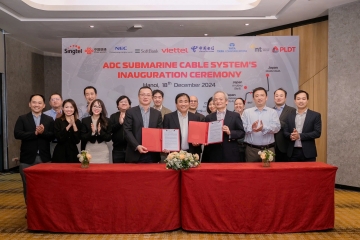Viettel provide 4G service in Q1 and deploy IPV6 in Q4/2017
According to the test results, Viettel 4G’s actual speed on the most modern terminal devices reach 289Mbps. With 4G technology, Viettel can completely provide 720p HD video services anywhere in the 4G coverage. Other quality standards are guaranteed under the technical regulations which MIC issued. Following Vung Tau, Viettel’s 4G service has been successfully tested in Hanoi.
About the price of 4G services, Mr. Hoang Son – Vice General Director of Viettel Group said: "Besides the cheaper rates compare to 3G, we also offer flexible 4G packages for customers to use services at the most reasonable costs."
In addition, under the leadership of the Working Party to promote national IPv6, Viettel has been actively involved in the transition process and closely following the national roadmap. According to the plan, in the period of 2016 - 2019, Viettel will implement IPv6 transition for fixed broadband services, mobile and IDC hosting.

It is expected that on May 12/2016, Viettel will deploy IPv6 for fixed broadband customers in 28 provinces and city across the country and will continue to extend the service to its clients in other cities in 2017 and subsequent years.
Besides expanding and developing IPv6 all over the country through the Vietnam National Internet eXchange (VNIX); Connecting and exchanging IPv6 traffic internationally, Viettel also set up to support IPv6 in IDC hosting services.
Sharing the plan in the near future, Viettel’s representative inform that with fixed broadband network, in December this year, the company plan to deploy the network infrastructure to provide IPv6 services for about 636,426 fixed line broadband (GPON technology) customers in 28 provines and cities. The other provinces are expected to be completed in the fourth quarter of 2017.




